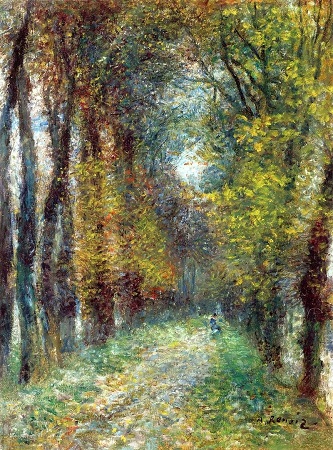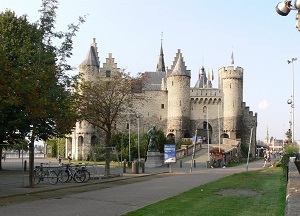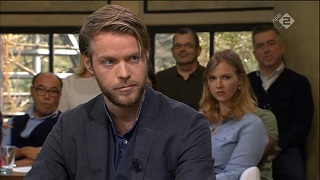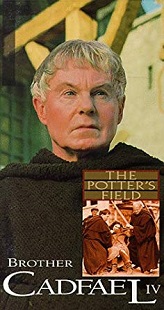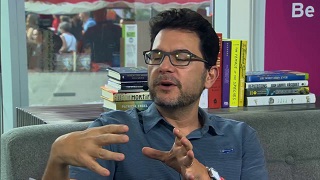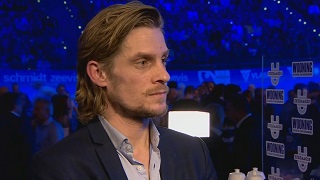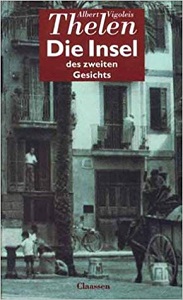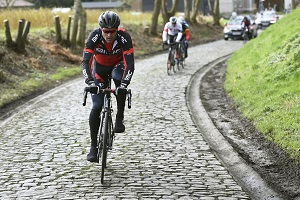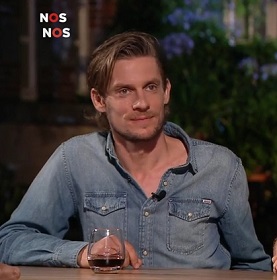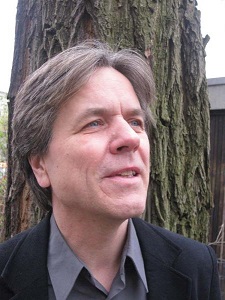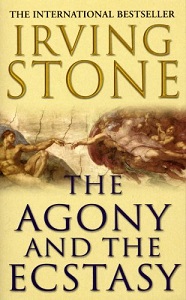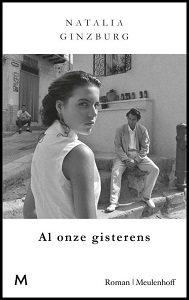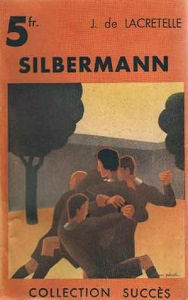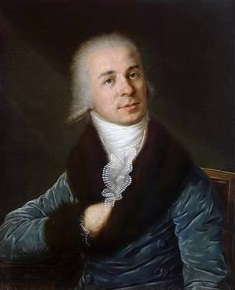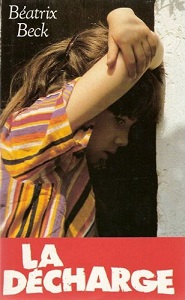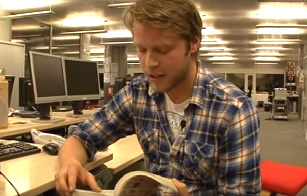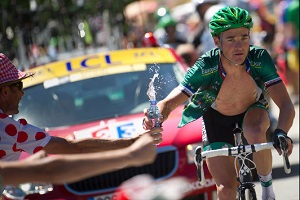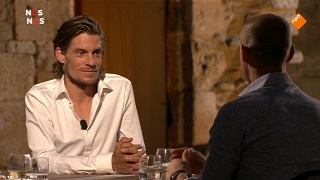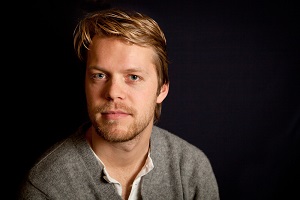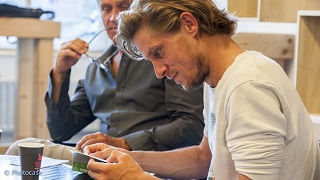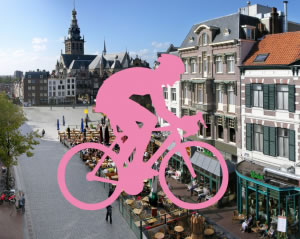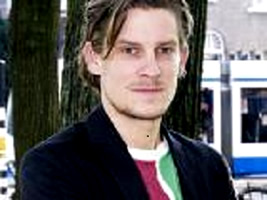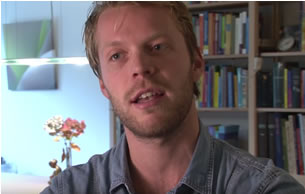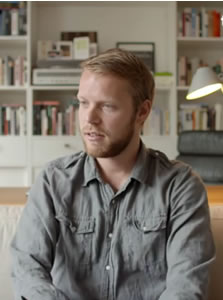Bij de Tour de France
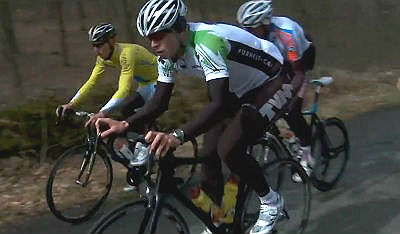
Uit: Wilco Kelderman bestaat niet: en andere wielerverhalen (Sven de wielrenner)
“Mijn dijbenen stonden in de fik. Mijn kuiten ontploften. En ik zweer dat ik mijn longblaasjes hoorde knappen, één voor één. Als ik nog adem had gehad, dan zou ik hebben gehuild om mijn moeder. Van de Milka-koeien en de klaterende beekjes om me heen kreeg ik niets mee: het enige wat ik zag waren de malende benen en de enorme reet voor me. Het leek zo’n goed idee, een keertje met Sven Kramer meetrainen in de aanloop naar de Olympische Spelen van Vancouver. Maar toen ik eenmaal in Zwitserland achter hem aan tegen een berg op fietste, wist ik niet meer waarom. En mijn lichaam al helemaal niet. Eenmaal terug in het hotel vroeg ik hem waarom hij in godsnaam niet ging wielrennen. Al was het maar om te bewijzen dat hij meer kon zijn dan koning van een sport die alleen groot is in Nederland. Hij moest erom lachen. Nou ja, een beetje dan. Want zo’n gek plan was het ook weer niet. ‘Misschien stop ik wel met schaatsen als ik straks drie gouden medailles win in Vancouver. En áls ik ooit stop met schaatsen,’ zei hij, ‘dan ga ik wielrennen.’ Het is nu vier jaar later. Sven Kramer heeft geen drie gouden medailles gewonnen in Vancouver. Hij bleef steken op één – dankzij een mislukte ploegenachtervolging en een verkeerde wissel. En Kramer is in de afgelopen vier jaar geen wielrenner geworden. Hij kwakkelde in het na-olympisch jaar met zijn rug en een dijbeenblessure, nam een sabbatical en besteedde de jaren daarna aan zijn comeback op het ijs. Een overstap naar de fiets is er nooit gekomen. Het had ook anders gekund. Hij heeft talent zat – óók als wielrenner. Er bestaat een foto uit 2004 met daarop het podium van het NK Tijdrijden voor junioren. Op het hoogste treetje staat Robert Gesink. Links naast hem staat de zeventienjarige Sven Kramer, die is gestrand op een paar seconden van Gesink. Later zou Kramer daarover zeggen:
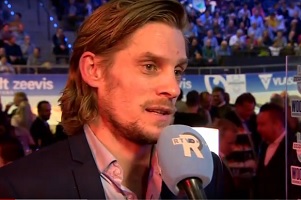
De Cubaanse dichter en schrijver Reinaldo Arenas werd geboren op 16 juli 1943 in Holguin. Zie ook alle tags voor Reinaldo Arenas op dit blog.
Uit: The Color of Summer (Vertaald door Andrew Hurley)
“Delfín Proust:
Where it should be you that grows
a mahogany tree spreads its wide boughs …
I grow old …
No longer am I the master of my fear and of the city;
I do as I am told.
Conquered are we all; a baleful light claims victory.
And we all grow old.
Of course, to console me there’s always this:
all that you are giving up, I can enjoy on the Hill of the Cross
where it should be you that grows.
Come back, and I’ll take you personally to Tina Parecía Mirruz.
Delfín
Proust tosses a mahogany-tree seed to Avellaneda, and it falls between
her breasts. Avellaneda picks out the seed, gazes upon it sadly, and
throws it into the sea. Immediately she becomes animated again.
Avellaneda:
From Betis harbor
along the shore
my little ship
sails free.
Rotten eggs
and mahogany seeds
shall never, ever
deflect me
from my chosen course.
So row, row, kindly oarsman,
for the morning
sun doth rise.
And I hie me to other shores.
The
sound of barking is heard. A bulldog appears, walking on its two hind
legs with the aid of a huge walking stick. This is the famous Nicolás
Guillotina, poet laureate of Cuba, who flaps his enormous ears and
shakes his walking stick threateningly at the fleeing poetess.
Nicolas Guillotina: (to a tune from Gilbert and Sullivan)
Flee this Island thou shalt not!
The Party, Miss Smarty, calls the shots,
and the Party has decided
that here with us thou shalt abide!
Ta-ra-ra, thou shalt not!
For the Party calls the shots.
Flee this land thou surely shalt not.
Here with us thou must remain.
Thou’rt a woman old and vain
and death on the high seas surely fear,
so let me whisper in thy ear:
Ta-ra-ra, thou shalt not!
For the Party calls the shots.
Flee this land thou surely shalt not.
If I must bide here and flee not
because the Party calls the shots,
what makes you think that you’re so grand, eh?
What’s sauce for the goose is sauce for the gander!
Ta-ra-ra, thou shalt not!
For the Party calls the shots!
Flee this !and thou most surely, most su-u-u-re-ly—shalt NOT!
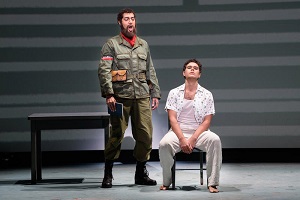
Calvin Griffin (l) als revolutionaire ambtenaar Victor and Elliot Madore (r) als Reinaldo Arenas in de opera “Before Night Falls“, 2017
De Belgische dichter en schrijver Georges Rodenbach werd geboren in Doornik op 16 juli 1855. Zie ook alle tags voor Georges Rodenbach op dit blog.
Dans l’air fraîchi, venant d’où…
Dans l’air fraîchi, venant d’où, déclose comment ?
Vers moi, par la fenêtre ouverte, une musique
Déferle à petites vagues si tristement.
Elle me fait à l’âme un mal presque physique.
Confuse comme un songe… est-ce d’un piano,
Est-ce d’un violon méconnu qui s’afflige
Ou d’une voix humaine en élans comme une eau
D’un jet d’eau qui s’effeuille en larmes sur sa tige.
Ah ! La musique triste en route dans le soir,
Qui voyage en fumée, en rubans, qui sinue
En forme de ruisseaux pauvres dans l’ombre nue,
Et trace de muets signes sur le ciel noir
Où l’on peut suivre et lire un peu sa destinée
Dont les lignes du son tracent la preuve innée,
Chiromancie éparse, oracle instrumental !
Puis s’embrouille dans l’air la musique en partance,
Eteignant peu à peu ses plaintes de cristal
Qu’on s’obstine à poursuivre aux confins du silence.
Dans le silence et dans le soir de la maison
Dans le silence et dans le soir de la maison
A retenti le carillon de la pendule.
On ne sait si joyeux ou triste, un air ondule :
Tantôt le chapelet de l’heure en oraison ;
Puis ce semble un oiseau si peu viable et frêle
Qui se baigne et qui joue avec des perles d’eau ;
Puis du verre qui pleut mêlé de fer qui grêle ;
Etincelles de bruit sous un vague marteau,
Musique d’une noce au retour, clopinante
Qui monte un escalier tournant, et disparaît ;
Bruit de verres choqués, cristal qui se lamente,
Grelots de la folie – oh ! Valses, vin clairet,
Carnaval fatigué de danses enragées
Qui s’en revient vidé d’argent et de raison
Et qui laisse dégringoler dans la maison
Ses derniers confetti, des sous et des dragées.
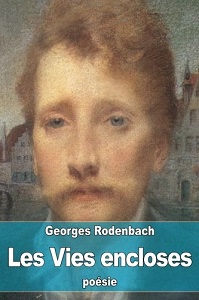
Cover
De Amerikaanse schrijver Tony Kushner werd geboren op 16 juli 1956 in New York. Zie ook alle tags voor Tony Kushner op dit blog.
Uit: Angels in America
“The
next day. Joe in his office at the courthouse in Brooklyn. He sits
dejectedly at his desk. Prior and Belize enter the corridor outside.
PRIOR (Whisper): That’s his office.
BELIZE (Whisper): This is stupid.
PRIOR (Whisper): Go home if you’re chicken.
BELIZE: You’re the one who should be home.
PRIOR: I have a hobby now: haunting people. Fuck home. You wait here. I want to meet my replacement.
(Prior goes to Joe’s door, opens it, steps in.)
PRIOR: Oh.
JOE: Yes, can I—
PRIOR: You look just like the dummy. She’s right.
JOE: Who’s right?
PRIOR: Your wife.
(Pause.)
JOE: What? Do you know my—
PRIOR: NO.
JOE: You said my wife.
PRIOR: No I didn’t.
JOE: Yes you did.
PRIOR: You misheard. I’m a Prophet.
JOE: What?
PRIOR: PROPHET PROPHET I PROPHESY I HAVE SIGHT I SEE.
What do you do?
(Joe comes out of his office.)
BELIZE: Run! Run!
JOE: Wait!
(They’re cornered by Joe. Belize averts his face, masking his mouth and chin with his scalf)
JOE:
What game are you playing, this is a federal courthouse. You said . . .
something about my wife. Now what .. . How do you know my—
PRIOR: I’m … Nothing. I’m a mental patient. He’s my nurse.
BELIZE: Not his nurse, I’m not a n—
PRIOR: We’re here because my will is being contested. Um, what is that called, when they challenge your will?
JOE: Competency? But this is an appellate court.
PRIOR:
And I am appealing to anyone, anyone in the universe, who will listen
to me for some . . . Charity . . . Some people are so … greedy, such
pigs, they have everything, health, everything, and still they want
more.”
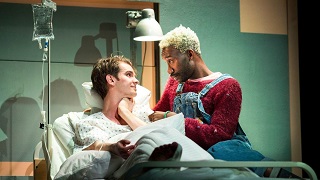
Scene uit een opvoering in New York, 2018
De Engelse schrijfster en historica Anita Brookner werd geboren op 16 juli 1928 in Herne Hill, een voorstad van Londen. Zie ook alle tags voor Anita Brookner op dit blog.
Uit: The Next Big Thing
“Herz had a dream which, when he awoke into a night that was still black, left him excited and impressed. He dreamed that he had received a call from his cousin, Fanny Bauer, the love of his life. He was to take her to the cinema, she ordained. Eager to conform to her wishes, as he always had been, he shrugged on his coat, and within seconds was elsewhere, as was the norm in dreams of wish-fulfilment. Although it was a weekday afternoon the cinema was so crowded that they had to stand at the back of the auditorium. Fanny was as he had always known her and still remembered her: petulant, with the petulance of a spoilt pretty woman, demanding and discontented. Shortly after the beginning of the film she had clutched his arm and declared that she felt unwell. Again, without transition, they found themselves in the vast café that was part of the cinema complex. Fanny had recovered somewhat but looked uncharacteristically dishevelled, with a large camel-hair coat slung over her shoulders. He was conscious of retaining his eager smile, but felt discomfited. This feeling had something to do with the coat, which he recognized as his own, the coat he should have been wearing. He had no memory of having offered it to her. The coat, and Fanny’s malaise, remained closely associated in his mind. It was only when he understood that it was he who had been taken ill that the dream attained its peak of significance. Ailing, smiling, he had offered her his remaining health and strength, and she, not in the least grateful, had carelessly dispossessed him, not noticing that she had done so. This was so akin to their real life association that, if anything, his newly-awakened self was conscious of its reality. Brought back to himself he was aware of the smile — of complicity, of acquiescence — directed to the corners of the dark bedroom. Only the relentless ticking of his clock informed him that he had woken up, that this would soon be a new day, all too closely resembling the others, the normal days of his present existence, in which nothing happened nor could be expected to happen.
He had not seen her for thirty years. In the dream they were both young and she was still unmarried, before Nyon, before Mellerio, before his own family had come to England. It was his longing that had made him feel close to her, since he thought about her so often and so much that there seemed to be no distance between them. This longing extended to her parents, whom he preferred to his own. He knew that his own parents were socially inferior, although he suspected that morally they had the upper hand. His mother had never forgiven her sister for marrying out, though by no means observant in her own right. His father, a modest man, deferred to his brother-in-law without ever feeling entirely comfortable in his presence. Yet it was this brother-in-law, Hubertus, who had guaranteed them safe passage out of Berlin. Their house, one of those chic villas that Hubertus was so good at constructing, had all the charm of a more carefree establishment, an hotel, for example, or some kind of resort.”

De Duitse schrijver en journalist Jörg Fauser werd geboren op 16 juli 1944 in Bad Schwalbach. Zie ook alle tags voor Jörg Fauser op dit blog.
Uit: Rohstoff
„Er hielt mir einen kurzen Vortrag über die Wirkungen von Rohopium. Was er sagte, stimmte im großen und ganzen, auch wenn er es nicht aus eigener Erfahrung wußte. Er hatte immer die sauberen Sachen gehabt, aber er war natürlich dabeigewesen, wenn den Opiumfans die Leber aus dem Mund geflatscht kam. Es wurde allmählich dunkel im Zimmer, aber er machte noch kein Licht. Er erzählte mir in Kurzform, was er über Apomorphin wußte, mit dem er es unter der Aufsicht eines englischen Arztes namens Dent nach fünfzehn Jahren geschafft hatte, die Stoffwechselkrankheit Sucht zu besiegen. »Der gute Doktor weilt ja leider nicht mehr unter den Lebenden«, sagte Burroughs, stand auf und machte frischen Nescaf6, »aber seine beiden Nurses praktizieren noch. Wenn Sie wollen, kann ich Ihnen die Adressen geben. Und dann haben wir noch einen Doktor in Frankreich, der die Apomorphin-Kur macht, und einen in der Schweiz.« Er suchte mir die Adressen raus und bemerkte, daß ich das einzige Bild im Zimmer fasziniert betrachtete. Auf den ersten Blick war es nur eine wilde Farbanordnung um einen Schriftzug, aber wenn man länger hinsah, entdeckte man seltsame Rhythmen und Strukturen, die alle den Schriftzug variierten. »Das ist von Brion Gysin, dem Maler und Cut-up-Kollaborateur«, erklärte Burroughs. »Sie sollten das mal ansehen, wenn Sie ein psychedelisches Mittel eingenommen haben — obwohl ich manchem auch davon abraten muß. Für viele Zeitgenossen ist es besser, wenn die Türen geschlossen bleiben.« »Dann würden Sie auch nicht jedem Cut-up empfehlen?« Er schenkte mir wieder ein sparsames wölfisches Lächeln. »Nun, junger Mann, der eine verträgt einen Löffel Rohopium, und der andere fällt um, wenn er gegen Pocken geimpft wird. Sind Sie Schriftsteller? Ich will ja nicht indiskret sein, aber wie ein Reporter sehen Sie für mich nicht aus.« Ich erklärte ihm, daß ich hoffte, bald zu veröffentlichen, und zwar in dem Verlag, für den Lou Schneider arbeitete. »Ach ja? Interessant.« Er verschwand im Nebenzimmer, kam aber im nächsten Moment wieder und drückte mir eine in braunes Packpapier gebundene Broschüre im Zeitschriftenformat in die Hand: William S. Burroughs: APO-33 Bulletin. Der Untertitel lautete: A Report On The Synthesis Of The Apomorphine Formula.

De Amerikaanse dichter, sociaal filosoof en cultuurcriticus William Irwin Thompson werd geboren op 16 juli 1938 in Chicago, Illinois. Zie ook alle tags voor William Irwin Thompson op dit blog.
Nightwatch
Call this night catacomb,
this chosen work,
broken sacrament.
Babel’s gift of tongues,
poetry breaks the sky apart.
So to Hell with art,
tomorrow I will start
undamnably to Him alone.
(Can I make the tongue bend
dumbly as knees
and make an altar rail of brutal teeth?)
Once
with broken open mouth
blundering like his eyes,
Saul crumbled from his beast,
re-covering light.
Childbirth
Over the bones were the nerves
Brittle six years ago stretched
On strings of the Ninth Quartet.
The still room hardly began
When space intruded with stars
As viciously beautiful eyes
Mocked what I thought was myself.
Now it is five in the morning
Of years and a continent crossed.
Becoming whatever I am
Involves still the labor of time.
But tonight my wife and a child
Labor their equal becoming.
Wife, bearing mortality, child.
Into this darkness you have come
Like the face undiminished by stars.
Lessened of weight. you grow light
As the morning windows succumb.
Evan. as you fall into life.
Remember your name is a rhyme.
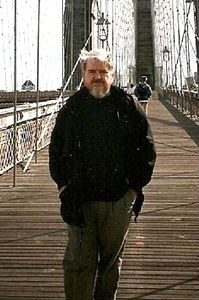
De Oostenrijkse schrijfster en politica Andrea Wolfmayr werd geboren op 16 juli 1953 in Gleisdorf. Zie ook alle tags voor Andrea Wolfmayr op dit blog.
Uit: Spielräume
„Ich les einen Roman von Knut Hamsun, einen Roman über die Ehe einer jungen Frau, die nicht zu Haus bei den Kindern bleiben will, die sich selbstverständlich alle Freiheit nimmt, die sie braucht, die einen Mann hat, der still und stark und Geschäftsmann ist und ihr alle Freiheit läßt, weil er sie liebt und weil er hofft, daß sie einmal zu ihm zurückkehren wird. Aber die Ehe zerbricht, und ihr hilft ihre Freiheit nicht mehr, weil der andere Mann, den sie liebt, sie verläßt, und sie hat alle Sicherheit verloren und will zurück zu ihrem Mann, aber der will sie nun auch nicht mehr. Doch sie finden einander wieder, und ihre Beziehung wird zu einer «richtigen» Ehe, sie will nichts mehr von ihren früheren Künstlerfreunden wissen, sie lebt nur mehr für ihren Mann und ihre Kinder, und alle sind sie glücklich.
Und ich les das und weiß: Es geht nicht, es stimmt nicht, so kann ich nicht leben, ich kann nicht nur für Mann und Kinder dasein. Aber etwas wird spürbar von so großer Liebe und starker Zuneigung, daß ich weiß, er hat recht, der Hamsun, er hat ja so recht, ich brauch das, jeder braucht das, und ich bekomm solche Sehnsucht, daß ich gleich nach Hause laufen möchte zu meinem Mann, daß ich bei ihm sein und ihn festhalten mischte und ihm sagen, daß ich nie wieder weggehen will. Er ist doch mein Mann, denk ich, wir sind verheiratet, ich möcht mein Leben lang immer nur mit ihm zusammen sein, ich hab nie etwas anderes erwartet; wir werden immer zusammen sein, das glaub ich auch jetzt noch, aber ich denk, daß es unmöglich geworden ist, durch meine Schuld ist es unmöglich geworden. Ich hab doch gewußt, was ich tu, ich hab doch gewußt, daß ich alles aufs Spiel setz. Ich hab ihn geheiratet, und ich hab gewußt, was ich tu, ein Leben lang, hab ich gedacht, mein Mann, ich bin seine Frau, nur seine Frau, hab ich gedacht. Ich wein bei jeder Gelegenheit, ich kann nicht anders. Ich hab geträumt, daß meine Tante aufgetreten ist in einem Flamencorock und mit gestepptem Chinesenjackerl, in einem deprimierenden Rotlilaviolett und großblumig, alles weit und häßlich und faltig, und etwas ist da wie von schwarzen Vögeln und dunklen Wolken, und dann wach ich auf … Im Hintergrund meines Traums andauernd Werbung, der Ö 3-Wecker ist eingeschaltet, wie immer, wenn ich bei Hans schlaf. Ich hör ihn telefonieren, er redet über die Sitzung, an der wir gestern teilgenommen haben, über die weiter zu unternehmenden Schritte; es macht mich müde, ich will nichts hören, ich verkriech mich in die Decke.“
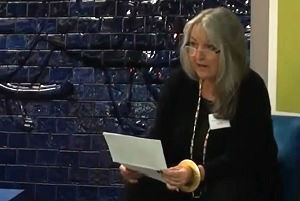
Zie voor nog meer schrijvers van de 16e juli ook mijn blog van 16 juli 2017 deel 2.

